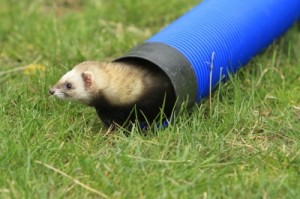Ferrets
 Did you know that there are more than 10 million pet ferrets in the US? Did you also know that ferrets are regulated state-to-state, meaning that before you buy one you may need to buy a permit and learn whether you are able to buy an unaltered male or female. Contact your local Wildlife or Fish and Game department before purchasing a ferret.
Did you know that there are more than 10 million pet ferrets in the US? Did you also know that ferrets are regulated state-to-state, meaning that before you buy one you may need to buy a permit and learn whether you are able to buy an unaltered male or female. Contact your local Wildlife or Fish and Game department before purchasing a ferret.
Ferrets may not only require your legal understanding, but they’ll require your patience and knowledge. Ferrets are not like owning a cat or dog, they are more prone to wild and hunting behaviors, which means that they require a lot of supervision before they can be given free reign of the house. Even after you’ve owned the ferret for years you may still find that they require your close attention.
Due to their inquisitive nature, you will need to ensure that you do a harm and danger reduction check in your house. Keep toilet lids down, ensure buckets are empty, don’t let empty toilet paper, paper towel or wrapping paper rolls to sit around as these are all dangerous to ferrets.
Ferrets can also be expensive animals, be sure to talk to your veterinarian about vaccinations and neutering prices. These on top of the price of the ferret can be very expensive. For many reasons you will want to neuter your ferret unless you plan to breed them. Ferrets have a natural musk to them that increases when they reach sexual maturity and become ready to mate. Ferrets in heat change their behavior and smell. The males become increasingly aggressive, and the female risks death if she remains unaltered and unable to mate. Female ferrets secrete high levels of estrogen and if this hormone stays in the blood for a prolonged period of time it will cause a progressive depression of bone marrow that results in a severe, life threatening aplastic anemia.
Ferrets need to be kept indoors as they are very temperature sensitive, they can suffer and die from heat stroke and frost bite. Make sure that if you’re keeping a ferret in a cage you have a large enough cage for the ferret to romp and play as well as rest and relax. You can litter train a ferret, but it requires time and patience. Unlike cats, it isn’t a natural instinct for the ferret to exit waste in kitty litter. Make sure that for the first while you leave the waste in the litter box so the ferret learns this is where they are supposed to go. Immediately remove and clean odors from accidents as it is the odors that attract the ferret to dispose of waste in certain corners.
Make sure that the ferret has an abundance of food and water available to them. They eat small portions periodically, so be sure to leave food out for them all day. ALso do research into the kind of food to feed ferrets. There is a lot of conflicting advice about what to feed ferrets, so be sure to talk about the ferrets diet with a vet. Generally it’s not a good idea to feed food to an animal that is not meant for that animal. Also be aware that in the wild ferrets eat smaller animals, so if you own rodents or birds that the ferret does not have access to them and that fish tanks have a closed lid on them.
Ferrets are great pets, just ask one of the millions of ferret owners. But you need to do your homework and decide if owning a ferret is right for you. They require a lot of attention and patience, so if you don’t have the time to commit to a ferret, you should probably look for another pet.










 Website Created by TCP Global Solutions
Website Created by TCP Global Solutions